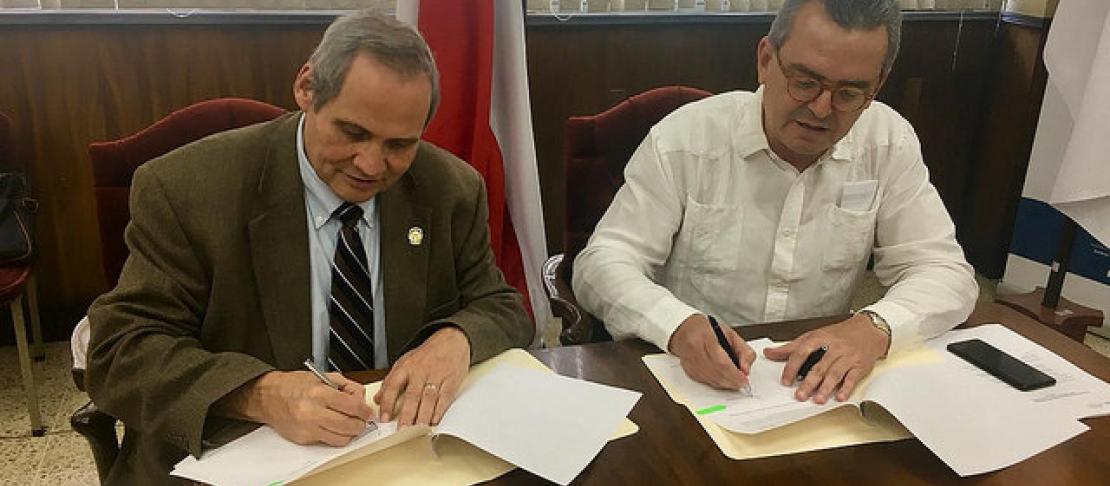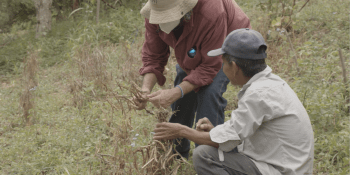Costa Rica’s Ministries of Agriculture and Environment join forces to comply with Paris Agreement

In February, Costa Rica’s Ministry of Agriculture and Livestock and Ministry of Environment and Energy signed an agreement to encourage the gradual reduction of greenhouse gas emissions in the agriculture and livestock sector.
Following COP21 in Paris, where 196 countries pledged to significantly reduce greenhouse gas emissions, the focus of the international climate debate has turned to the need for policies and concrete actions that will prevent temperature rises of more than 1.5℃ and ensure food and nutrition security for the most vulnerable.
Costa Rica, a world leader in terms of environmental conservation and sustainability, just took an important step towards achieving its Nationally Determined Contribution (NDC) to reduce greenhouse gas (GHG) emissions within the agriculture and livestock sector. The sector is currently responsible for approximately 37% of national GHG emissions. Of that proportion, 54% is nitrous oxide, a gas with high global warming potential.
Instead of merely focusing on the amount of emissions that must be reduced, the formulation of the agreement between the two ministries was seen as an opportunity to involve small-, middle- and large-scale farmers and to reflect upon the conditions needed for the transformation into a resilient, low-carbon sector. Furthermore, in consideration of the significant role of the private sector in the decarbonization of Costa Rica’s agriculture and livestock production and the sector’s increasing vulnerability to climate change, the formulation of the agreement was embedded in a process of participatory dialogue with high-emissions agriculture corporations, as well as government officials, non-governmental organizations and academia. The main objective was to encourage dialogue between key actors (private, public, research and academia) on possible pathways to eco-competitive development of Costa Rica’s agricultural sector that take into consideration future changes in climate and extreme climate events.
Navigating the transition to a low-carbon agriculture and livestock sector is no easy task, with a broad range of stakeholders, continuously evolving consumer patterns, connectivity to Central America and the wider global food system, and the challenges farmers face to stay resilient to changes in climate. For this reason, the Ministry of Agriculture and Livestock (MAG) and the Ministry of Environment and Energy (MINAE) decided to use a future scenarios approach, which would allow the exploration of possible future uncertainties that might influence the sector’s ability to gradually shift towards an economy where low-emission farming is the established norm.
The scenarios methodology used in this process was developed by the CGIAR Research Program on Climate Change, Agriculture and Food Security (CCAFS) and the University of Oxford, and implemented in Central America and the Andes region by the University for International Cooperation (UCI) in collaboration with Utrecht University’s Copernicus Institute of Sustainable Development.
Over a period of two months, MAG experts and policymakers collaborated with leaders of high-emission agriculture corporations, as well as with experts from national universities and research organizations, to create and analyse a set of four diverse, hypothetical future scenarios. These scenarios are stories of the future told in words and images that show different plausible pathways of socio-economic, environmental and political development of Costa Rica’s agriculture and livestock sector.
The analysis of these scenarios resulted in a series of recommendations for the government and the private sector to facilitate the transition towards a resilient and low-carbon agriculture and livestock sector. These recommendations were then used in a series of smaller meetings to discuss, debate and draft the agreement.
The agreement has established the route to decarbonization of Costa Rica's agriculture sector. It promotes research and innovation and continuous improvement in methods for measuring greenhouse gas emissions; the development and adoption of technologie; and actions to promote access to international markets and to educate consumers nationwide. It will be adjusted after five years in order to ensure its continued progression and maintain consistency with the country's vision for ambitious emissions reduction.
The agreement follows from Costa Rica's international commitment to reduce emissions in coffee and livestock production, established in the country's Nationally Appropriate Mitigation Actions (NAMAs), and promises to develop new actions in other subsectors. For several years now, the sector’s dialogue on resilience to climate change and emission reduction has been an integral part of the government's efforts to comply with international guidelines on climate change adaptation and mitigation, and is being carried out with the support of international development agencies such as the United Nations Development Program (UNDP), CCAFS and the German Corporation for International Cooperation (GIZ).
Marieke Veeger is scenarios and policy researcher ar the University for International Cooperation (UCI) and CCAFS Latin America. Charlotte Ballard is a research assistant at the Copernicus Institute of Sustainable Development at Utrecht University. Alexandra Popescu works as a communication officer for CCAFS Latin America. Agripina Jenkins works for the United Nations Development Programme (UNDP) in Costa Rica.



